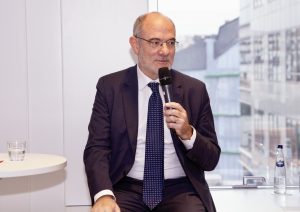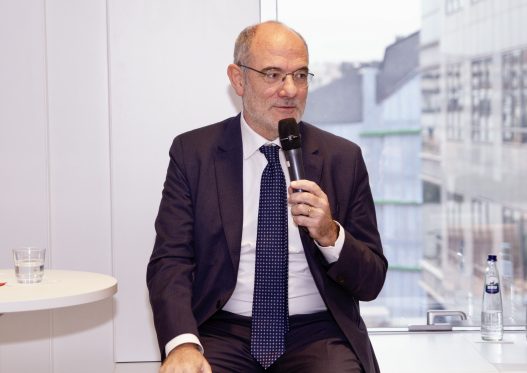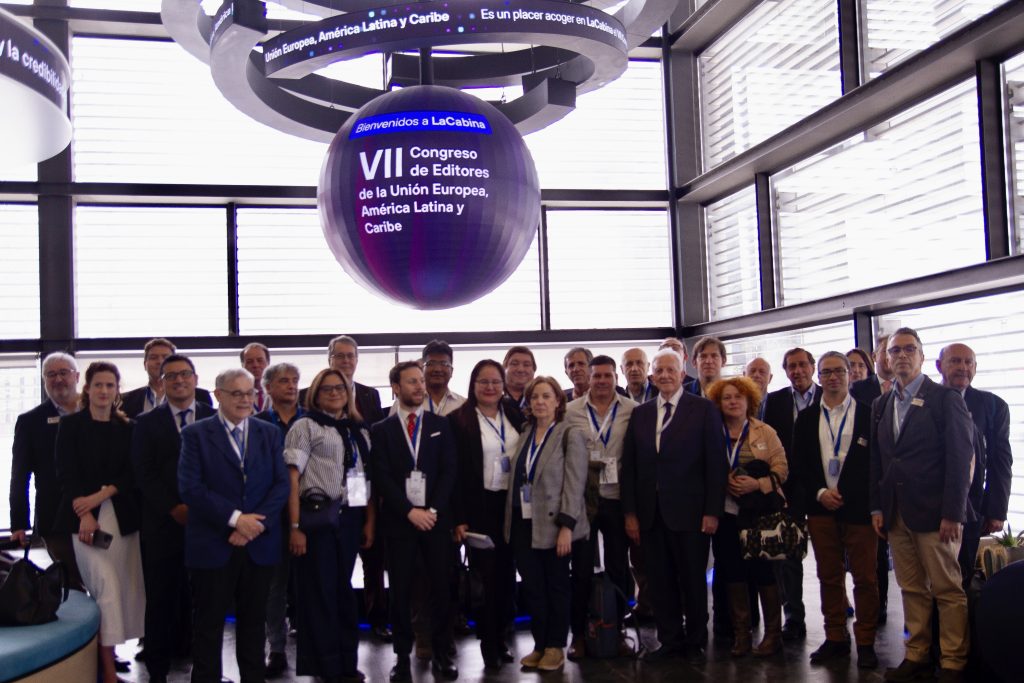
‘IN 10 YEARS, WE WENT FROM TALKING ABOUT ROAMING TO DISCUSSING EUROPE'S STRATEGIC AUTONOMY': JAUME DUCH
The European elections will take place between June 6 and 9. The citizens of the Union will elect their representatives to the Parliament and from this composition will emerge the president of the European Commission.
For Jaume Duch, general director of Communication and spokesman of the European Parliament, these elections will be more important than the previous ones, so it is required that there is a high participation, if possible, higher than that of 2019, when a record was already broken.
Duch expressed these explanations at the headquarters of the European Parliament, in Brussels, during his participation on March 21, 2024, in the fourth and last day of the VII Congress of Media Editors of Europe, Latin America and the Caribbean.
“These will be more important elections because the world has changed so much,” Duch explains. “Existential issues are under debate today. In 2014, in the election campaigns people were talking about roaming; already for the 2019 elections, Brexit and climate change were at the center of the discussion, of great interest to young people, which increased participation.” On that occasion, 50.6% of voters went to the polls.
What are those existential issues that Duch talks about and that mark the elections in 2024? “Climate change is still one of the important issues, but it also includes, given the war between Ukraine and Russia, the transcendental issue of the security and defense of Europe.”
In addition, there are aspects such as the reconversion of the energy strategy so that Europe is not dependent on Russia in this field. Also, industrial reconversion, for which it is necessary to rethink aspects such as access to land and minerals, for example. As if there were not enough complex issues, there is also the question of the enlargement of Europe to include countries, some of which have the particularity of bordering Russia.
In short, says Duch, “in these elections we are talking about Europe’s strategic autonomy”.
This is what the election is about. Traditional parties such as the European Socialist and Popular parties (the left and the right of the continent), plus the liberal forces and the ecologists are of the idea of debating strategic autonomy with community perspectives, considering the strength of the European Union to play in the world geostrategic field.
On the other hand, other parties on the rise, those considered extreme right-wing nationalists, are more along the lines of each country defining how to deal with these issues; they are parties that have a critical position on the very convenience of the existence of the European Union, which they see as a giant bureaucratic institution that does not yield benefits for the population.
For Duch, the upcoming election is so important that he believes that its results will mark the evolution or involution of the European Union.
Or perhaps of the world, since Duch considers that “this year, in reality, there are two transcendental elections for the world: the European and the American elections; the combination of the results will tell us what we are going to do in the future”.
It was thought that globalization would solve everything. Duch says that, on the contrary, it was learned that “globalization has its limits, that not everything is a market, that not everything is reduced to buying products at the best price; it is not so simple”.
THE ROLE OF THE MEDIA
A growing phenomenon around elections around the world – and the European elections are no exception – is disinformation, fake news, as part of the communication strategies of agents interested in distorting the truth to manipulate voters.
Duch considers that “disinformation occupies the spaces left free by information”. For this reason, he believes that it is crucial that the independent journalistic media do their professional work to provide the public with verified, contrasted and plural information.
He also affirms that the percentage of participation will depend to a great extent on the space and treatment given to the elections by the media. “People must be clear about what is at stake in Europe and act accordingly”.
AFTER THE VOTE
Once the results of the elections are known, the parties in the Parliament will have to start negotiations to designate who will head the European Commission, the continental executive.
Polls indicate that the European People’s Party may win the largest number of seats, which opens the possibility that its leading figure, Ursula von der Leyen, will be re-elected as President of the European Commission. The new Commission is due to take office in November or December of this year.
However, the composition of the Commission will no longer only have to take into account regional balances, which have always been taken into account; ideological balances will now also have to be taken into account, due to the large presence of representatives of far-right parties that is predicted.
An Election.de poll published at the beginning of March indicates that the European People’s Party would win 171 of the 720 seats in dispute.
The Socialists and Democrats would come in second place with 142 MEPs. Then come the Liberals, with 86. The survey indicates that the same number of MPs would be won by each of the two extreme right-wing parties ID and ERC. That is to say, the two most conservative forces would add, together, 172 seats, on a par with the Popular Party.
The results of this poll are completed with 51 seats for the Greens-EFA, 39 for the Left and 59 for the non-affiliated parties.
ABOUT THE CONGRESS OF EDITORS
The VII Congress of Media Editors of the European Union, Latin America and the Caribbean is an event organized by Grupo Prestomedia with the support of EditoRed, the European Commission and the European Parliament, Telefónica, Iberia and the Community of Madrid, as well as the collaboration of the Universidad Rey Juan Carlos, Turismo de Galicia and Casa de América, and with Prensamedia as editorial partner.
This year, the general theme of the Congress is: “The quality of information and the credibility of the media, guarantees for democracy”. The meeting took place on March 18-19, 2024 in Madrid, Spain, and on March 20-21 in Brussels, Belgium.
————
This text is free to use. If you use it, please cite EditoRed.



